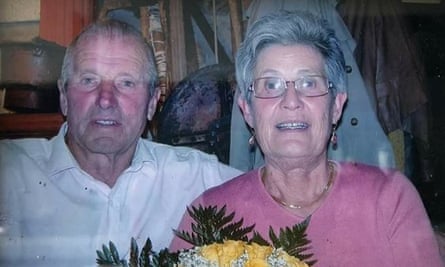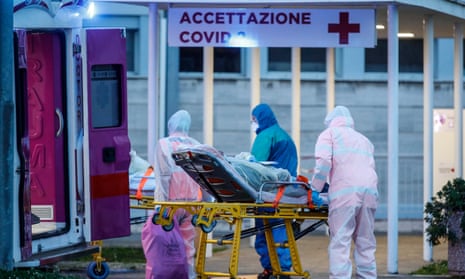There are the elderly couples who died hours apart and without their families around them. There is the 47-year-old woman who died at home, and who remained there for almost two days because funeral companies refused to collect her body. There are the doctors who lost their lives after assisting their infected patients.
Among the 2,158 people to have been killed by the coronavirus pandemic in Italy as of Monday, the oldest was 95 and the two youngest were 39.
“The reality is this virus is spreading like wildfire. Death is not certain, but the contagion is real,” said Luca Franzese, whose sister, Teresa, 47, died at home in Naples on 7 March.

“My parents are heartbroken, they are destroyed,” he told the Guardian
Teresa, who lived with her elderly parents, sister, brother-in-law and their two children, suffered from epilepsy but was otherwise in good health. A week before she died, she came down with the flu.
“My parents called her doctor but they refused to come to the house despite knowing she had a disability,” said Franzese.
“She went into a coma on 7 March, we tried to call the emergency hotline, they arrived after 40 minutes. In the meantime, I tried to give her mouth-to-mouth resuscitation.”
Teresa tested positive for the virus postmortem. Franzese spoke of his family’s frustration at being “abandoned” by the authorities after his sister was left to die at home.
It was only after he made an appeal for help via Facebook that a local funeral company eventually came to collect her body. But as with other coronavirus victims, she was buried quickly and without ceremony to mitigate the risk of infection posed by her corpse. Her parents, who have underlying health issues, tested negative for the virus, as did Luca and a nephew. The rest of Teresa’s immediate family of seven have tested positive.
Silvio Brusaferro, the president of Italy’s Higher Institute of Health, said on Friday that the average age of coronavirus victims was 80.3, with the majority having suffered underlying illnesses. The most common additional health issue was arterial hypertension followed by chronic heart disease, atrial fibrillation and cancer.
More than 70% of those who have died were men. The two 39-year-old victims were a man with diabetes and a woman with cancer. The vast majority of deaths have been in the northern Lombardy region (1,420 as of Monday night), followed by Emilia-Romagna (346) and Veneto (69).
But not all of the dead had other health issues, at least as far as is known. Luca Carrara lost his father, Luigi Carrara, 86, and mother, Severa Belotti, 82, within a few hours of each other. He told the Italian press they were in good health. “I was unable to see my parents, they died alone, that’s what this virus is,” he added. “The truth is this is not a banal flu and if you end up in hospital, you leave either alive or dead.”
The couple lived in Albino, a town in the badly-affected province of Bergamo in Lombardy. The harrowing impact of the virus on the area can be gleaned from the obituary section of the local newspaper L’Eco di Bergamo.
On Friday, reader Giovanni Locatelli shared online footage comparing the newspaper’s obituary section on 9 February, when listings took up just one page, to a copy dated 13 March, when 10 pages were needed to commemorate the dead.

In Codogno, the Lombardy town where the outbreak began, Enrico Palestra lost his 80-year-old father, Giovanni, who was otherwise in good health. “It’s not a normal flu like people are saying,” Palestra told the Guardian. He declined to speak further.
Another victim in Codogno was the 74-year-old uncle of Alessandro, who asked for his surname not to be used. “He got a fever five days ago and died on Sunday,” said Alessandro. “He was in good form, didn’t smoke and had no previous illnesses. A good part of my family are sick with this virus.”

Alessandro, who lives in Lake Garda, between the Lombardy and Veneto regions, added: “People who don’t live here don’t realise how bad it is. We’re hearing ambulances every half an hour as they take the sick to hospital. It’s striking.
“What amazes me is that other countries are seeing these things, not only England, but have taken precautions too late – or not been decisive enough ones. This worries me.”
Several medics have died, among them Roberto Stella, the president of the order of doctors in Varese, Lombardy. The 67-year-old was tending to patients until he started to suffer symptoms and went into intensive care himself. He died last Wednesday.
“They are all doctors who had no fear of going into combat knowing the risks they were running,” said Saverio Chiaravalle, the vice-president of the Varese doctors order and a close friend of Stella.
“They died on the field, but when you are in combat you don’t imagine it could happen to you. The enemy is invisible, but this is like a war, and the only solution is to isolate – those who have to work must work with precautions, the rest must stay at home.”
